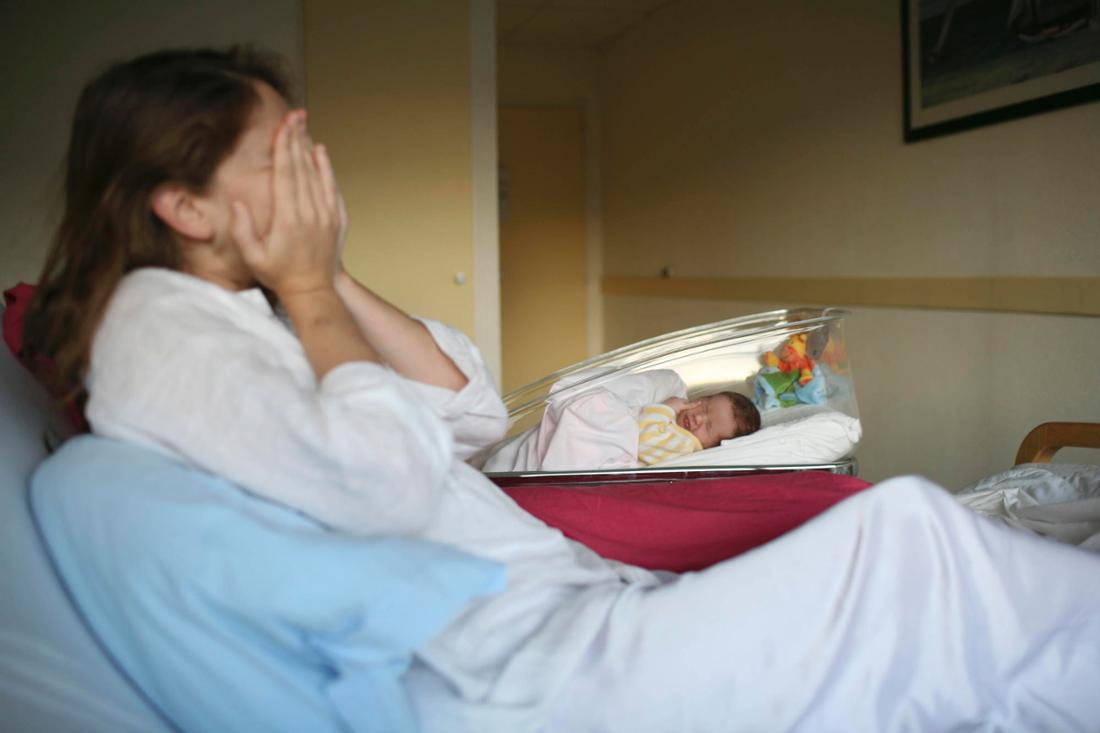
“Understanding that there are others who have experienced something similar is important”
Press

Anna-Lena Köhnlein, psychotherapist in the maternity ward at the university hospital, talks about the need to remove the taboo surrounding mental illnesses surrounding childbirth.
Why is the issue of mental health surrounding childbirth so important to you?
I would like to point out that this very special time surrounding the birth is often accompanied by high expectations and therefore a lot of pressure for the expectant parents. This pressure can promote the development of mental illnesses. Then we talk about peripartum mental illnesses, i.e. mental illnesses surrounding the birth. There is still too little information about this, although education is an important part of prevention.
What are the most common mental illnesses that occur in women during childbirth?
Peripartum mental illnesses come in different forms. There are the “baby blues,” which occur in over 50 percent of women after giving birth. Women may feel very depressed for the first few days afterwards. This is not a disease that requires treatment in the strictest sense, because it is hormonally related and usually goes away after a few days. If we now talk about illnesses that require treatment, depression and anxiety disorders are the most common among mothers at this time, at 10 to 15 percent. What still exists are post-traumatic stress reactions triggered by negative birth experiences.
Are there risk factors that increase the risk of peripartum mental illness?
Yes, this is a complex interplay of bio-, psycho- and social factors that increase the likelihood of such a disease occurring. In general, people can have a predisposition to develop mental illnesses. This occurs if you or a family member has had a mental illness in the past. What I find quite interesting is that studies have shown that personality aspects also have an influence. Perfectionism is mentioned above all. Other risk factors include a lack of social support and complications that can occur during and after pregnancy, such as prematurity, breastfeeding difficulties or traumatic events such as miscarriages. A lack of communication about the birth procedures can also have a negative impact on the psyche because it can rob women of their sense of self-determination.
Would you say that societal ideas about motherhood can also impact peripartum mental health?
I think that has a really big influence on it. There are numerous social narratives and representations that portray the time surrounding birth as pink and flowery and beautiful. The challenges that come with this time often receive less attention. This can lead to those affected feeling very alone with their experiences and afraid to ask for help. In addition, every family and every woman is different and has their own ideas about how they want to live their lives. There is no one, universal way to organize birth and later child-rearing. Nevertheless, mothers are often subject to strong pressure to meet different demands. Instead, it is important to empower women to find their own path.
How is the diagnosis of peripartum mental illness made?
There is a spectrum of different symptoms and not all of them necessarily occur. An important indicator is when the women themselves or their relatives notice that something is wrong. Suddenly, everyday life can no longer be managed as usual or the women describe a lack of motherly feelings or the worry that they are not being a good mother. Those affected often report an inner emptiness. The diagnosis of depression often proceeds in stages. This ranges from mild to severe depression, where suicidal thoughts or even infanticide, i.e. killing one’s own child, are possible. However, it is possible to intervene so that such a serious course of events does not occur in the first place.
To person
Annalena Köhnlein (32) works as a psychological psychotherapist in obstetrics and prenatal medicine at the University Hospital Frankfurt (head: Prof. Dr. Louwen). There she supports women in psychological crisis situations surrounding childbirth.
Before their approval as a psychotherapist in 2022, she studied psychology at the University of Bamberg, Heidelberg and Leeds in the UK.
Psychology in obstetrics (head: Dr. Oddo-Sommerfeld) at the university hospital is, in addition to the psychotherapeutic care of patients, also responsible for research on the topic of mental health in the context of pregnancy and birth.
How good are the chances of improvement?
The prognosis for successful treatment is very good. Especially when the symptoms occur for the first time. I would like to emphasize that you don’t necessarily need a diagnosis to get help.
What treatment options are there if you want to get help?
It is often a great relief to confide in your own midwife or treating doctor. Exchanging ideas with other affected people through self-help groups or on the Internet is also very helpful. Understanding that there are others who have experienced something similar is important. Of course, there are also advice centers that you can turn to – there you can also get tips for further help, whether it is the self-help group, the “cry clinic” or psychotherapy. There is also the option of drug treatment. In acute cases, when those affected realize that they can no longer manage it, there is also the option of going to a clinic. There are also special mother-child clinics that accept mothers with their babies so that the mothers do not have to be separated from their children during the treatment.
Are there ways to act in advance?
I think it is very helpful to explain as early as possible that the time surrounding the birth can be associated with psychological stress. The aim is not to give the expectant parents additional fear, but simply to convey from the start that it’s okay if this turbulent time doesn’t always feel good – that there’s nothing wrong with you. You have the right to receive support. Gynecologists should also draw more attention to the issue; after all, they are very close to women. However, in my opinion, the most important thing is to create space as a couple, family or circle of friends to talk about negative emotions and take them seriously.
What else can the environment do? ?
In addition to the appeal, it is above all important not to trivialize the feelings of the person concerned, be it the mother or the father. After all, emotions are always an indication of your own needs and limits, which should not be responded to with a “pull yourself together”. Rather, it is important to listen, try to understand and look for solutions together. Maybe there are even things that the environment can relieve those affected of.
What might that look like?
Ultimately, it’s about reducing or even preventing overload by distributing responsibility across several shoulders. It starts with small gestures, like a friend bringing over something to eat. But strengthening the self-efficacy of those affected can also be a great help. This not only means taking on tasks, but also motivating those affected to have the confidence to do things again and take things into their own hands. However, you shouldn’t build up too much pressure. Relatives or friends of those affected also have the right to seek help in such a situation. After all, supporting someone to cope with mental illness can be very stressful and the last thing we want in this situation is a domino effect where everyone ends up feeling worse.


Ethel Purdy – Medical Blogger & Pharmacist
Bridging the world of wellness and science, Ethel Purdy is a professional voice in healthcare with a passion for sharing knowledge. At 36, she stands at the confluence of medical expertise and the written word, holding a pharmacy degree acquired under the rigorous education systems of Germany and Estonia.
Her pursuit of medicine was fueled by a desire to understand the intricacies of human health and to contribute to the community’s understanding of it. Transitioning seamlessly into the realm of blogging, Ethel has found a platform to demystify complex medical concepts for the everyday reader.
Ethel’s commitment to the world of medicine extends beyond her professional life into a personal commitment to health and wellness. Her hobbies reflect this dedication, often involving research on the latest medical advances, participating in wellness communities, and exploring the vast and varied dimensions of health.
Join Ethel as she distills her pharmaceutical knowledge into accessible wisdom, fostering an environment where science meets lifestyle and everyone is invited to learn. Whether you’re looking for insights into the latest health trends or trustworthy medical advice, Ethel’s blog is your gateway to the nexus of healthcare and daily living.



